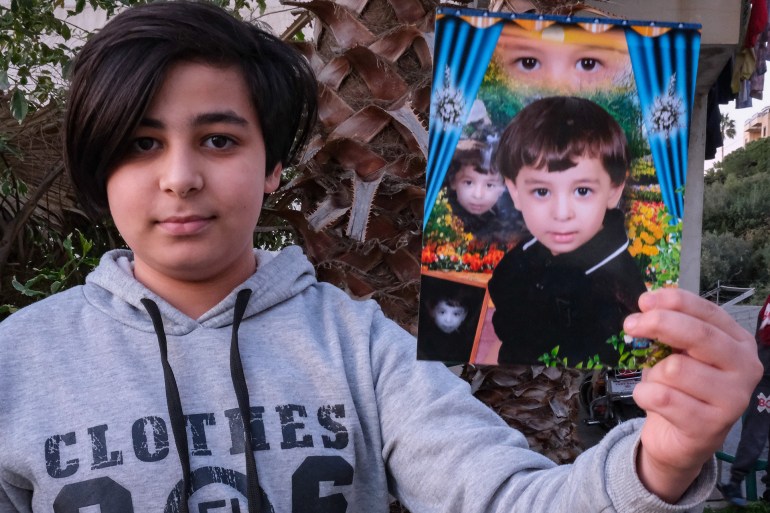Overnight, Samer found himself paralyzed, Bakri's leg was amputated and Ruqaya fled to France, and others faced more miserable and cruel fates and were separated in search of safety.
Ten years after the outbreak of the Syrian revolution, which has turned into a grinding war, 10 Syrians narrate how their lives have changed during a decade of grueling war, which made them lose a lot and pushed some of them to search for a new beginning.
Some of them reside in areas controlled by the regime and others are in areas of influence of their opponents, including refugees, and summarize their pictures and stories to painful chapters of their lives.
And they talk about the scars left by the war that accompany them wherever they go.
And tomorrow, Monday, the Syrian conflict enters its eleventh year, burdened with massive destruction and a death toll of more than 388,000, except for the displacement and displacement of millions at home and abroad.
In Damascus, Samer Sawan (33 years old) shows a smiling picture of him standing on the seashore in the coastal city of Lattakia, but today he sits in a wheelchair.
His life was turned upside down in 2011, when a bullet entered his car while he was in it, losing control of it and overturning.
As a result, he was permanently paralyzed.
Like Samer, nearly 1.5 million Syrians have been disabled due to war injuries, according to UN statistics in 2019.
Among those with disabilities were Bakri al-Debs (29 years old) and Muhammad al-Hamid (28 years old).
In the place where he was injured in the 2015 air strikes in the town of Ihsam in the southern countryside of Idlib (northwest), Bakri, with a leg amputated, sits on a cracked staircase, with an artificial leg near him.
In his hands, he holds an old picture in which he appears to be sitting near his university in Latakia.
Muhammad remembers his condition before the amputation of his leg and the killing of his brothers and his son in 2016 (French)
Consecutive tribulations
Leaning on crutches in Idlib due to the amputation of his right leg, Muhammad, the opposition fighter, holds an old photograph in which he appears in complete fitness, in military uniform, holding his weapon.
2016 was a pivotal year in Muhammad's life, during which he was wounded in one of the battles in the Latakia countryside and his brother was killed in his arms.
Then his losses followed as he received the news of the killing of 3 other brothers in prison two years after their arrest.
In 2017, his home in Idlib was bombed and one of his children was killed.
As for Abu Anas (26 years), who lost his sight last year, he appeared from Idlib with a selfie he took 10 years ago, when he was 16, and his dreams were still great.
"I have suffered and am still suffering from difficulties," he says with a sigh. "I can no longer carry out the activities that I used to do."
He added, "Nothing in the world can compensate a person for his eyesight, but whoever lives here knows that at any moment he can die or lose part of his body, and this is the most difficult."
In Aleppo (north), Ahmed Nashawi shows a photo as he stands in front of his damaged house due to the fierce battles that the city witnessed for years between the regime forces and opposition factions.
Child Yamen fled Eastern Ghouta and is currently living as a refugee in Lebanon (French)
Escape from Hell
To escape from the war and in search of new beginnings, the two journalists, Dima al-Qaed, emigrated from Damascus and Ruqaya al-Abadi from Deir al-Zor, as well as Fahd al-Ratban from al-Raqqa, and Anas Ali and al-Child, the army safe from Eastern Ghouta, near Damascus.
Near the Citadel of Erbil, Dima holds a photograph of her, one of the rare things that she took from Damascus after selling her family's home.
"I did not carry a key to return with me," she says, adding, "I dreamed of changing the world, so that the war would surprise me with a change in my world."
Ruqayya had cooperated with relief organizations and was detained for months, then worked with a campaign that documented the violations of the Islamic State organization during its control of her city.
After her security was threatened, she left Syria in 2015. She arrived in Paris as a refugee at the end of 2018.
Her picture in Paris is bright and her smile is wide, unlike pictures taken in Syria in 2011.
Anas, a refugee in Paris, two years ago, recalls wounds he sustained while covering battles between the regime forces and the factions on the outskirts of Damascus.
In Lebanon, Fahd has been settled since 2013 and works as a vet in the city of Tripoli (North).
A picture appears on his cell phone while he was performing his compulsory military service 11 years ago.
In the Yarmouk camp, south of Damascus, the Palestinian painter, Muhammad al-Rakoui (70 years), finds himself among the rubble of his studio, from which a picture he carries while playing with colors remains.
"My loss is irreparable, my drawing is destroyed, my paintings are stolen and my colors are scattered everywhere," he says.

